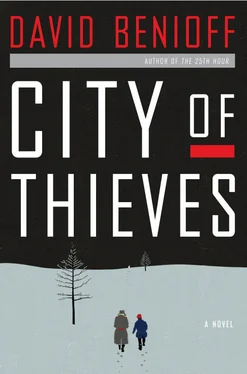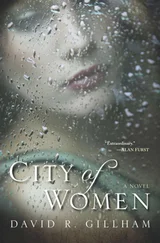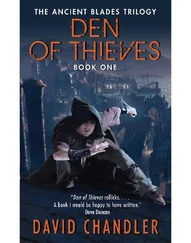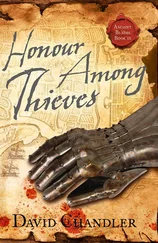“The Nazis adore you,” said Vika. “Were you quoting Mein Kampf ?”
“Tried to read it once. Very dull.”
“What did you say to them?”
“I told them I had a wager for Herr Abendroth. That my friend here, a fifteen-year-old boy from the less-fashionable side of Leningrad, could play without a queen and still beat the Sturmbannführer in a game of chess.”
“I’m seventeen.”
“Oh. Well, fifteen is more of an insult.”
“Is this a joke?” asked Vika, head tilted to one side, watching Kolya and waiting for him to smile and explain that he had done no such stupid thing.
“No joke.”
“You don’t think he’ll wonder how you knew he was here? Knew his rank, knew that he played chess?”
“I think he’ll wonder all of those things. And that will make him curious, and that will make him come to us.”
“What’s the bet?” I asked him.
“If he wins, he can shoot us dead on the spot.”
“He can shoot us dead whenever he wants, you thick-headed fool.”
“That’s what the troopers said. Of course he can. But I told them that the Sturmbannführer is a man of honor, a man of principle. I told them I trust his word and I trust his spirit of competition. They love all that blood and honor horseshit.”
“What do we get if I win?”
“First, he sets all three of us free.” He saw our expressions and cut us off before we could speak. “Yes, yes, you think I’m an idiot, but you two are the slow ones. We can’t play now, with the convoy moving. With any luck the game happens tonight, inside, away from all of this.” Kolya waved his hand, indicating the German soldiers standing in loose circles, chatting and smoking; the half-tracks loaded with provisions; the heavy artillery.
“He’ll never set us free.”
“Obviously he’ll never set us free. But we’ll have a much easier shot at him. And if the gods are smiling, maybe we’ll even have a chance to run.”
“‘If the gods are smiling,’” said Vika, mocking Kolya’s pomposity. “Have you been paying attention to this war?”
The mechanics had reset the track on the self-propelled howitzer. The driver and his crew hopped into the hatch. Moments later the engine coughed back to life and the long-turreted beast groaned into motion, cracking through the ice that had formed around its cast-steel track pads. The infantrymen didn’t seem in any rush to get back to their trucks, but after their final hoarse-voiced good-byes, with the officers shouting and the convoy beginning to snake forward, they took long last drags on their cigarettes, flicked them away, and hopped back onto the tarpaulin-covered flatbeds.
The trooper who had set off with the message for Abendroth jogged back to his unit. When he saw us watching him, he nodded and smiled. His face was pink and hairless, his cheeks round, and it was easy to picture him as a baby bald and bawling. He hollered at us, a single German word, before catching up to his already rolling truck, reaching out a hand, and letting one of his compatriots haul him onboard.
“Tonight,” said Kolya.
Our guards had already barked at us, knowing we didn’t understand and not caring. The message was simple enough. The prisoners formed into lines again, Vika drifted away from us, and we waited for the long convoy to pass. When the Kommandeurwagen motored by, I tried to spot Abendroth, but the window glass was frosted over.
I remembered something that had been bothering me and I turned to Kolya.
“What’s the second thing you asked for?”
“Hm?”
“You said if I win, first he sets us free. So what’s the second thing you asked for?”
He looked down at me, his eyebrows tilted toward each other, incredulous that I could not guess.
“Isn’t it obvious? A dozen eggs.”
That evening we sat with the other prisoners in a sheep barn just outside of Krasnogvardeysk. The air smelled of wet wool and dung. The Germans had given us a few twigs for firewood and most of the men were gathered around a timid little fire in the center of the barn. Tonight they were too tired to talk of escape. They complained with little vigor that the Germans hadn’t fed us since the morning biscuit, they muttered predictions about the next day’s weather, and soon all of them were sleeping on the cold ground, spooned together for warmth. Vika, Kolya, and I sat with our backs against the splintering wood wall, shivering, debating whether or not the game would happen.
“If he sends for us,” Vika said, “if they bring us to him, I promise you, they will search us for weapons.”
“They already searched the prisoners. What are they going to think, we found guns in the sheep barn?”
“The man knows he’s a target. He’s very careful. They’ll find the guns.”
Kolya responded with a mournful fart, low and solemn as a single note from a baritone horn. Vika shut her eyes for a few seconds, breathing through her mouth. I studied her pale red lashes in the firelight.
“All the same,” she said at last, “they will find the guns.”
“So what should we do, strangle the man?”
She reached into her coveralls, pulled her Finnish knife from the sheath on her belt, and began carving a little grave in the frozen dirt. When it was deep enough, she buried her pistol and held out her hand for Kolya’s.
“I want to keep it.”
She waited with her outstretched hand and finally he handed it over. When both pistols were covered with soil, she unbuttoned her coveralls and unbuckled her belt. Kolya gave me a little nudge. The coveralls had slipped off Vika’s shoulders; beneath them she wore a heavy wool woodcutter’s shirt and two layers of long underwear, but for a moment I saw her collarbone shifting beneath skin speckled with dirt. I had never before given any conscious thought to another human’s collarbone; hers looked like the wings of a gliding seagull. She yanked off her canvas belt, lifted her woodcutter’s shirt and the two undershirts to just below her breasts, held the shirts in place with her chin, and strapped the belt to her bare skin. The knife sheath now rested against her sternum, and when she pulled down the undershirts and the woodcutter’s shirt and rebuttoned her coveralls, it was impossible to detect its shape.
She took my hand and placed it against her chest. “Do you feel anything?”
I shook my head and Kolya laughed. “Wrong answer.”
Vika smiled at me. My hand still rested on her padded chest. I was scared to move it and scared to keep it there. “Don’t listen to him, Lyova. He was born from his mother’s ass.”
“You two want some privacy? I could cuddle up with old Edik over there. He looks lonely.”
“What about my knife?” I asked her.
“I forgot about your knife.”
“Let me have it,” said Kolya. “I know how to use it.”
“No,” said Vika. “They’ll search you the most carefully. You’re the only one who looks like a soldier.” She leaned forward and I pulled away my hand, certain that I had somehow missed an opportunity even if I didn’t know what it was or where it went. She unclipped the sheath from my boot and hefted it in her hand for a moment, pondering its size and shape. Finally, she slipped it deep inside my boot, under my sock. She examined the boot again. Nothing was visible. She patted the leather and seemed satisfied.
“Can you walk normally?”
I stood and took a few steps. I could feel the sheath point digging into my foot, but it seemed secure, held firmly in place by my sock and my boot.
“Look at him,” said Kolya. “The silent killer.”
I sat down beside Vika again. She touched the soft spot below my ear and drew her finger across my throat, stopping below the other ear.
Читать дальше












